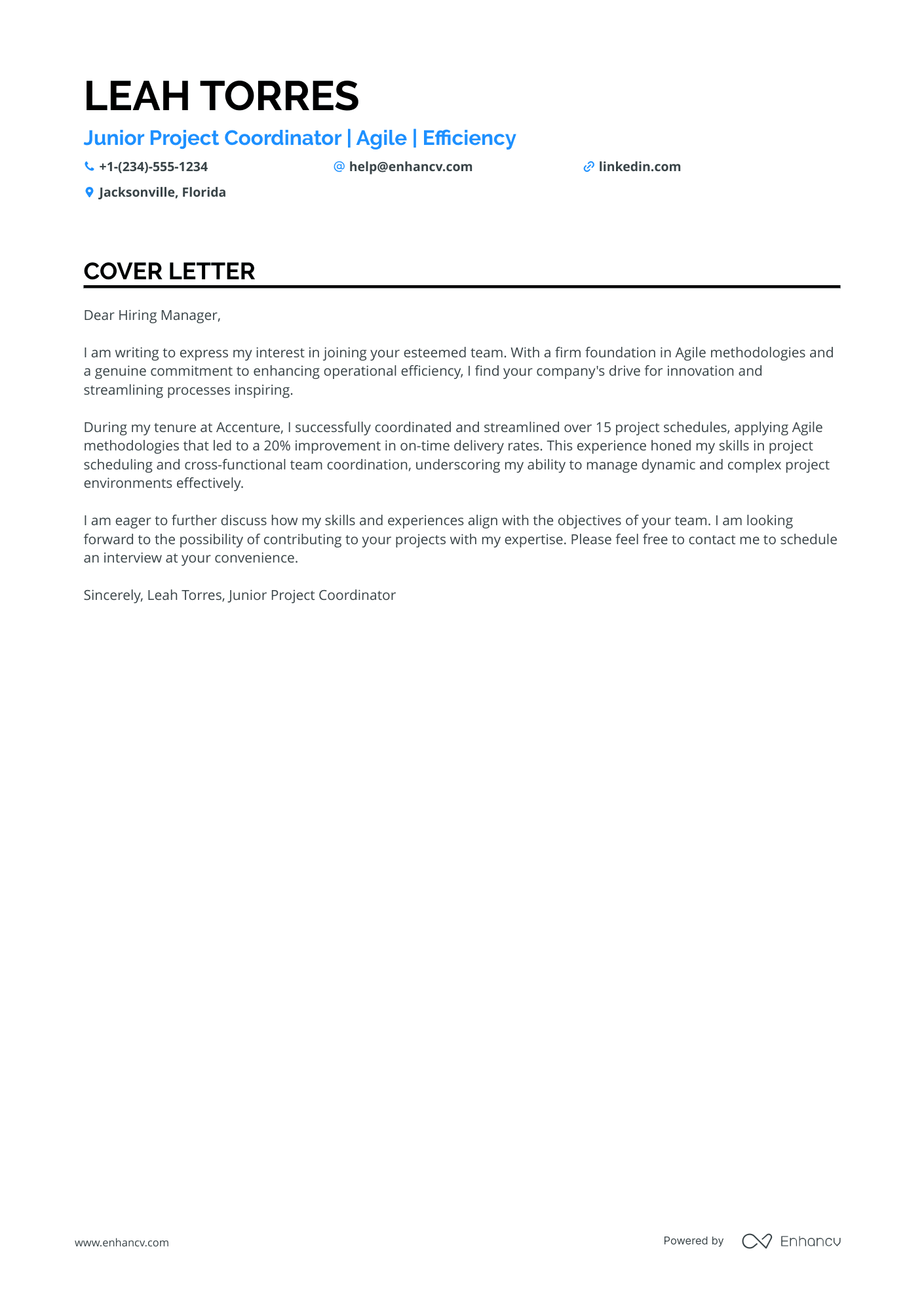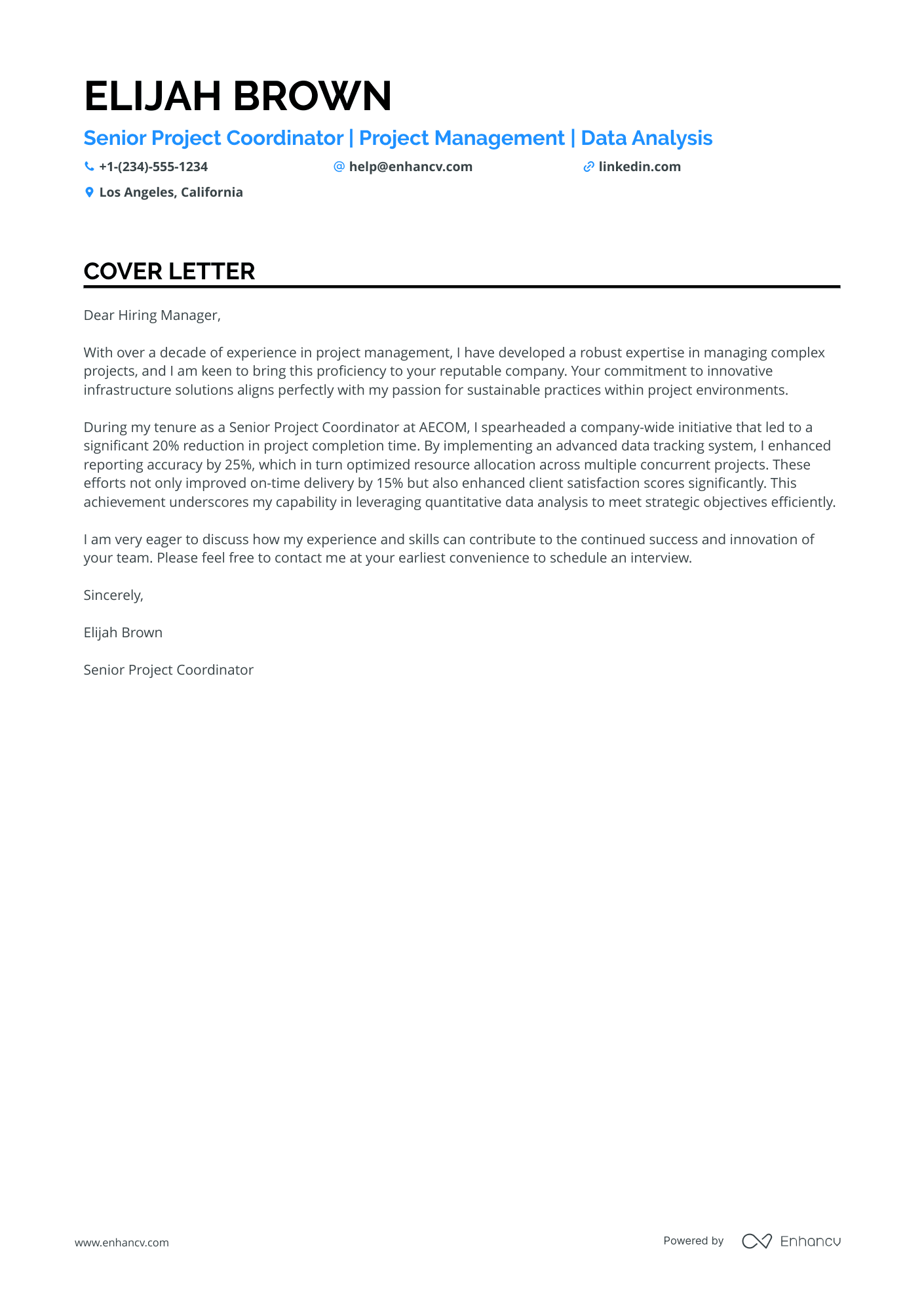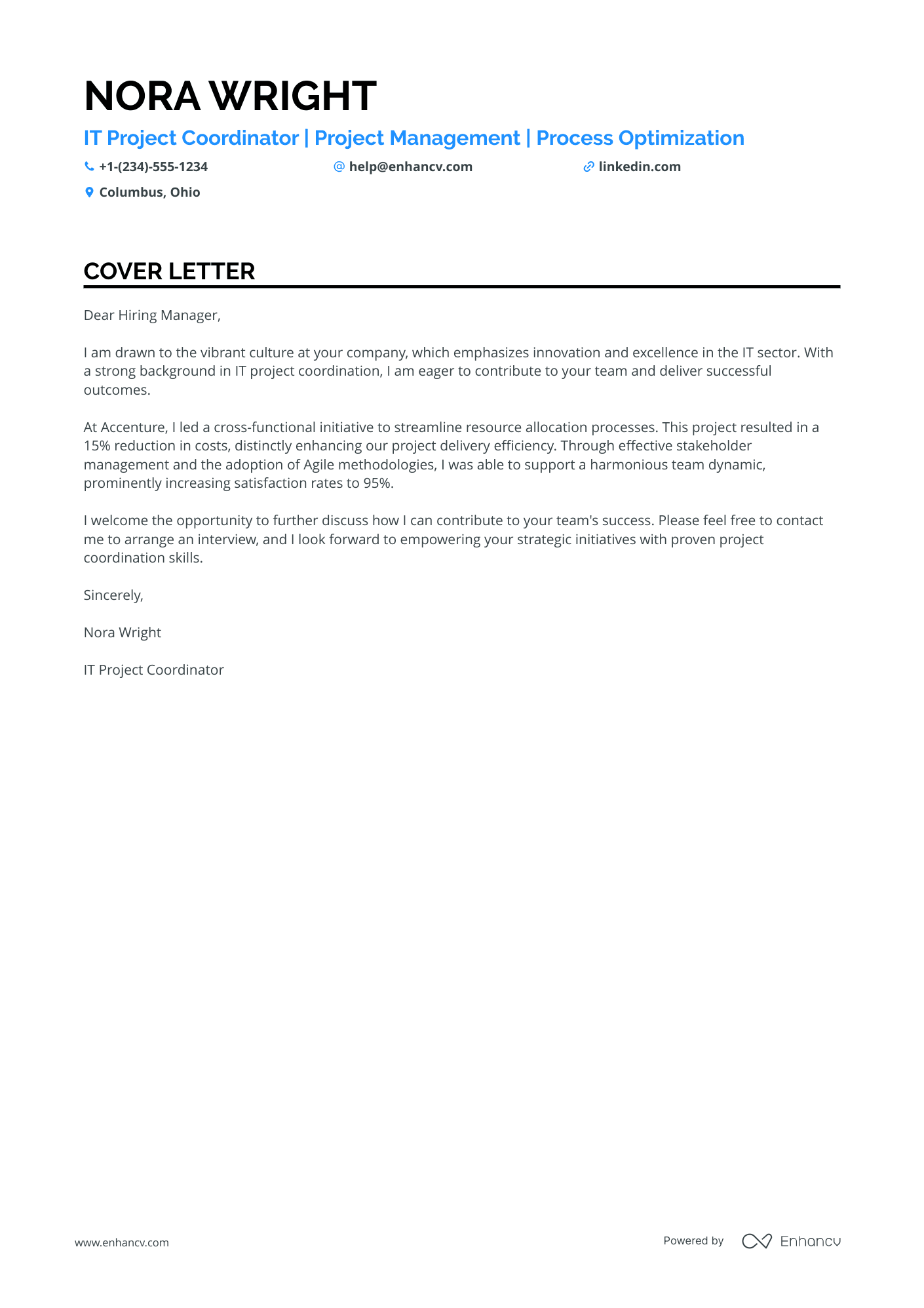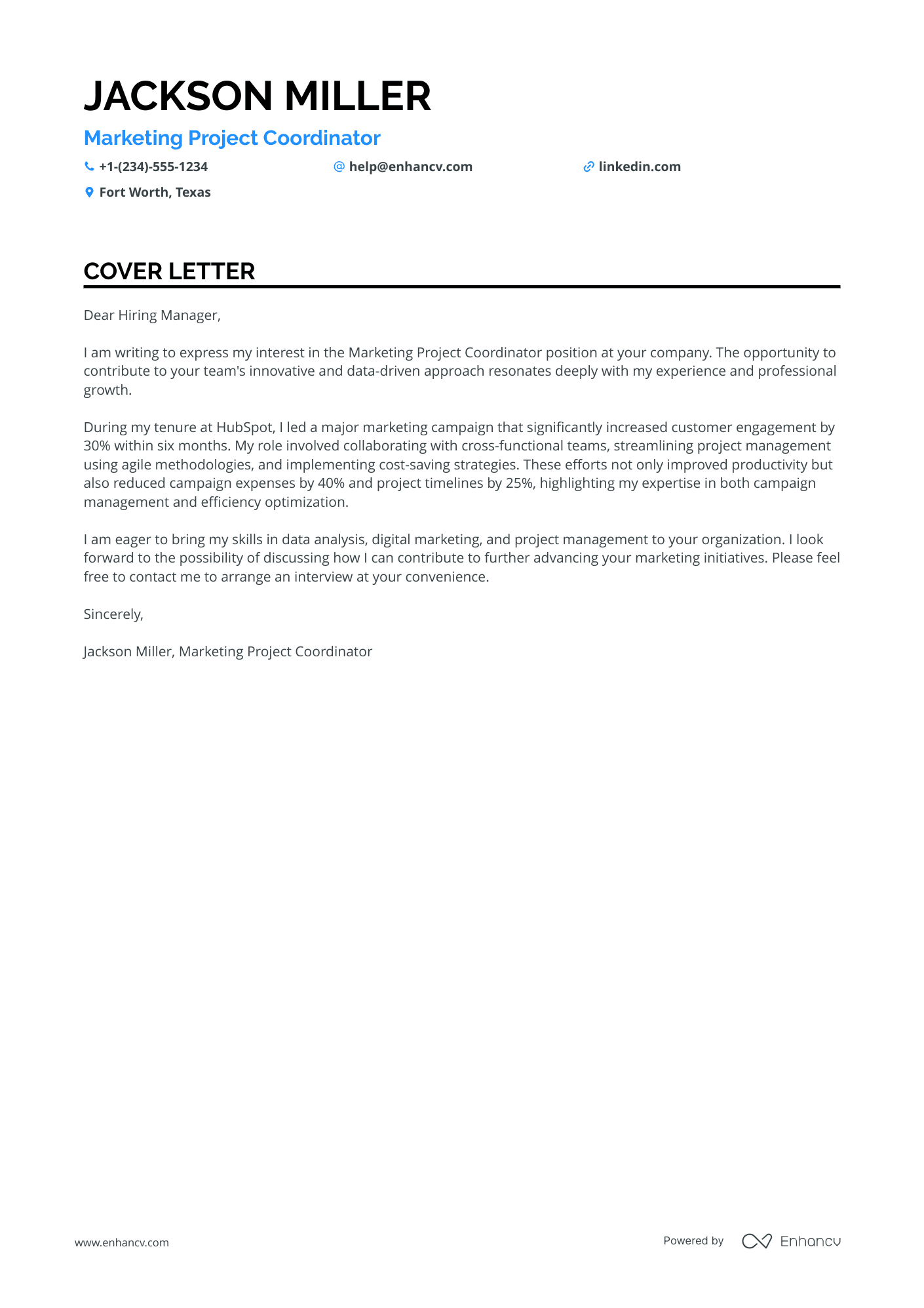Embarking on your job search, you've likely realized that applying for a project coordinator role requires more than a polished resume—it demands a captivating cover letter. This critical document is not a resume echo but an opportunity to spotlight your crowning professional achievement through a compelling narrative. Maintain a formal tone while eschewing clichés, and remember, brevity is key: your cover letter should cap at one powerful page. Let's unravel the art of crafting a letter that sets you apart.
- Including all the must-have paragraphs in your structure for an excellent first impression;
- Learning how to write individual sections from industry-leading cover letter examples;
- Selecting the best accomplishment to tell an interesting and authority-building professional story;
- Introducing your profile with personality, while meeting industry standards.
And, if you want to save some time, drag and drop your project coordinator resume into Enhancv's AI, which will assess your profile and write your job-winning cover letter for you.
If the project coordinator isn't exactly the one you're looking for we have a plethora of cover letter examples for jobs like this one:
Drop your resume here or choose a file.
PDF & DOCX only. Max 2MB file size.
Project coordinator cover letter example
Charlotte May
Appleton, WI
+1-(234)-555-1234
help@enhancv.com
- Strategic Narrative: The cover letter emphasizes the ability to create engaging narratives, which is crucial for fundraising and donor engagement in community-oriented projects.
- Impactful Achievements: Specific outcomes such as securing significant funding and expanding project reach are highlighted, showing the candidate's effectiveness and results-driven mindset.
- Financial Acumen: Mentioning strategic budget management aligns with the project coordinator role, showcasing the candidate's capacity to oversee financial resources judiciously.
- Relevant Prior Experience: Direct references to past experience in similar roles demonstrate the candidate's suitability and preparedness for the challenges of the position.
What about your project coordinator cover letter format: organizing and structuring your information
Here is one secret you should know about your project coordinator cover letter assessment. The Applicant Tracker System (or ATS) won't analyze your cover letter.
You should thus focus on making an excellent impression on recruiters by writing consistent:
- Header
- Greeting
- Introduction
- Body paragraphs (and explanation)
- Promise or Call to action
- Signature (that's optional)
Now, let's talk about the design of your project coordinator cover letter.
Ensure all of your paragraphs are single-spaced and have a one-inch margins on all sides (like in our cover letter templates).
Also, our cover letter builder automatically takes care of the format and comes along with some of the most popular (and modern) fonts like Volkhov, Chivo, and Bitter.
Speaking of fonts, professionals advise you to keep your project coordinator cover letter and resume in the same typography and avoid the over-used Arial or Times New Roman.
When wondering whether you should submit your project coordinator cover letter in Doc or PDF, select the second, as PDF keeps all of your information and design consistent.
Why worry about your cover letter? Create one instantly using our free cover letter generator.
The top sections on a project coordinator cover letter
- Header: Include your name, contact information, and the date to ensure the recruiter can easily identify who you are and how to contact you for further discussion about the project coordinator position.
- Greeting: Address the hiring manager by name if possible, as it demonstrates that you have done your research and are personally engaged with the potential employer, showing a level of professionalism and attention to detail.
- Introduction: Introduce yourself by briefly mentioning your current role, your interest in the project coordinator position, and why you believe your skills and experience make you an ideal candidate, setting the tone for the letter and engaging the reader's interest.
- Body: Elaborate on your project coordination experience, key skills like communication, leadership, and organizational abilities, and any achievements or certifications relevant to the role that illustrate your capability to successfully manage projects and work with a team.
- Closing: Express your enthusiasm for the opportunity to contribute to the prospective company's projects, reiterate how your experience aligns with the job requirements, invite the recruiter to review your attached resume, and include a proactive statement about looking forward to discussing your application in further detail.
Key qualities recruiters search for in a candidate’s cover letter
- Exceptional organizational skills: Necessary to manage multiple project elements, timelines, resources and ensure everything is on track.
- Strong communication and interpersonal abilities: Essential for coordinating with team members, stakeholders, and clients, and to effectively convey project updates and issues.
- Proven track record in project management: Demonstrates experience in overseeing projects from inception to completion, ensuring efficiency and success.
- Detail-oriented approach: Critical for managing complex tasks and to mitigate risks by paying attention to the nuances of project scope and requirements.
- Ability to problem-solve and adapt: Important for addressing unforeseen challenges and making necessary adjustments to project plans.
- Proficiency in project management software and tools: Shows that the candidate can efficiently utilize the necessary technological tools to streamline project coordination processes.
Greeting recruiters with your project coordinator cover letter salutation
What better way to start your conversation with the hiring manager, than by greeting them?
Take the time to find out who the professional, recruiting for the role, is.
Search on LinkedIn, the company website. And for those still keen on making a fantastic first impression, you could even contact the organization, asking for the recruiter's name and more details about the job.
Address recruiters in the project coordinator greeting by either their first name or last name. (e.g. "Dear Anthony" or "Dear Ms. Smarts").
If you're unable to discover the recruiter's name - don't go for the impersonal "To whom it may concern", but instead use "Dear HR team".
List of salutations you can use
- Dear Hiring Manager,
- Dear [Company Name] Team,
- Dear [Department Name] Manager,
- Dear Mr./Ms. [Last Name],
- Dear Project Management Team,
Introducing your profile to catch recruiters' attention in no more than two sentences
The introduction of your project coordinator cover letter is a whole Catch 22 .
You have an allocated space of no more than just a paragraph (of up to two sentences). With your introduction, you have to stand out and show why you're the best candidate out there.
Set out on a journey with your project coordinator cover letter by focusing on why you're passionate about the job. Match your personal skills and interests to the role.
Another option for your project coordinator cover letter introduction is to show you're the ideal candidate. Write about how your achievements and skills are precisely what the company is looking for.
However you decide to start your project coordinator cover letter, always remember to write about the value you'd bring about. Making it both tangible (with your metrics of success) and highly sought out.
That one achievement in your project coordinator cover letter body
The lengthiest part of your project coordinator cover letter is the body.
Within the next three to six middle paragraphs, present yourself as the best candidate for the role.
How can you do that without retelling your whole professional resume?
Select one key achievement that covers job-crucial skills and technologies (and is memorable).
Within the body of your project coordinator cover letter, aim to tell the story of how you achieved your success. Also, write about how this would help out your potential team.
Ending your project coordinator cover letter to avoid "sincerely yours"
Yes, this sort of closing statement may work best before your signature.
But you want to give recruiters something more with your project coordinator cover letter ending.
Some professionals choose to go down the path of promises. In a single sentence, they map out what they'd bring about to the role (whether that's a particular technical skill set or personal traits).
Others, decide to be more concrete by thanking recruiters for their time and prompting for their next interview.
Whatever path you choose, remember to always be polite and respectful of the opportunity you've had. Good manners go a long way.
What to write on your project coordinator cover letter, when you have zero experience
The best advice for candidates, writing their project coordinator cover letters with no experience, is this - be honest.
If you have no past professional roles in your portfolio, focus recruiters' attention on your strengths - like your unique, transferrable skill set (gained as a result of your whole life), backed up by one key achievement.
Or, maybe you dream big and have huge motivation to join the company. Use your project coordinator cover letter to describe your career ambition - that one that keeps you up at night, dreaming about your future.
Finally, always ensure you've answered why employers should hire precisely you and how your skills would benefit their organization.
Key takeaways
Your project coordinator cover letter is your best shot at standing out by showing your motivation and the unique skills you'd bring to the job:
- Chose no more than one achievement, which you'd be talking about in the body of your project coordinator cover letter, by focusing on skills and outcomes;
- Address recruiters with their first or last name, or "Dear Hiring Manager" in your project coordinator cover letter greeting;
- Introduce in no more than two sentences what makes your profile unique (perhaps it's your motivation, enthusiasm, or appreciation of the company you're applying for);
- Select the same font you have used in your resume (avoid Times New Roman and Arial, as most candidates tend to invest in them);
- Close your project coordinator cover letter with a promise of how you see yourself growing in the company and the benefits you'd bring about.
Project Coordinator cover letter examples
By Experience
Junior Project Coordinator
- Emphasizing relevant past experience: The letter highlights coordination and streamlining achievements from the candidate’s previous role, showcasing their capability in similar environments.
- Use of quantifiable outcomes: The mention of a 20% improvement in delivery rates emphasizes the candidate's impact and effectiveness in project management.
- Alignment with company values: The letter articulates admiration for the company's innovation and processes, suggesting alignment with the organization's goals and culture.
Senior Project Coordinator
- Quantifiable Achievements: Highlighting specific numerical data, such as the 20% reduction in project completion time and 25% improvement in reporting accuracy, effectively demonstrates the applicant's direct impact on previous projects.
- Alignment with Company Values: Mentioning a shared interest in sustainable practices shows an understanding of the company's vision and how the applicant's values align with it, potentially making them a cultural fit.
- Problem-Solving Skills: The example of implementing an advanced data tracking system provides a clear illustration of the candidate's ability to identify and solve complex problems, which is crucial in project management roles.
- Effective Communication: Expressing eagerness to discuss contributions in an interview invites further dialogue and shows confidence in the value the candidate can bring to the organization.
By Role
IT Project Coordinator
- Emphasize alignment with company culture, showcasing appreciation and understanding of the company's core values and priorities.
- Highlight key achievements in previous roles, such as the 15% reduction in costs and improved satisfaction rates, which directly correlate to the desired outcomes in project coordination.
- Demonstrate proficiency in relevant methodologies and practices, like Agile, which are critical in efficiently managing IT projects.
Marketing Project Coordinator
- Emphasizing Relevant Experience: The cover letter highlights a specific achievement in a previous role, such as leading a marketing campaign that increased customer engagement by 30%. This underscores relevant experience that aligns with the position.
- Quantifying Achievements: By providing concrete data, like reducing campaign expenses by 40% and project timelines by 25%, the letter effectively illustrates the applicant's impact and outcome-driven approach.
- Highlighting Key Skills: Skills in data analysis, digital marketing, and project management are mentioned, aligning with the essential competencies required for a Marketing Project Coordinator role.












